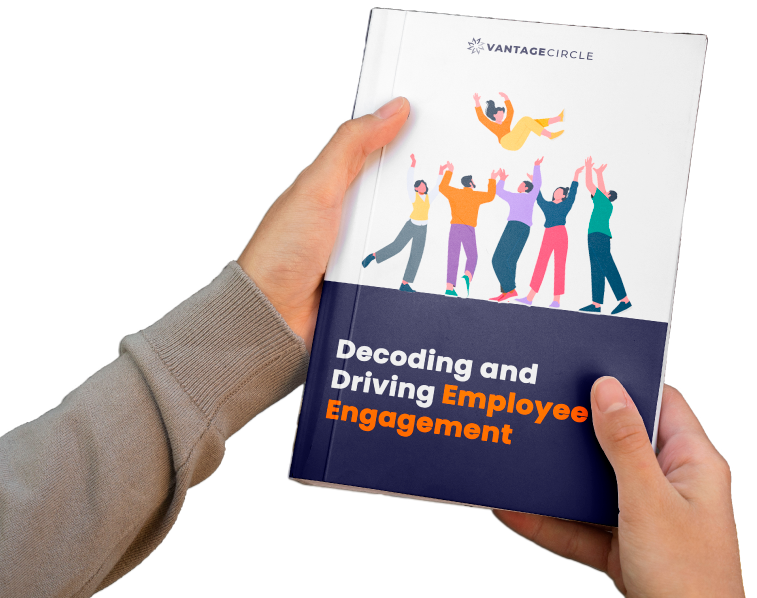'Speak Human, Build Culture' : Emotional Intelligence in the Age of AI

A Global Employee Recognition and Wellness Platform
With 18 years in HR across diverse sectors—from agile digital platforms to the deeply structured world of government undertakings—I’ve seen how people-related challenges vary widely, but solutions often lie in one simple truth: communication that feels human.
Over the years, I’ve worked with leaders in people operations and teams through highs, lows, pivots, and plateaus. And if there’s one thing I know for sure, it’s this—when people feel seen, heard, and understood, they engage more meaningfully and perform at their best.
So, as AI quietly takes over more of our workflows—from screening resumes to sending automated birthday notes—it’s natural to wonder: What place does emotional intelligence have in this new world? Will emotional intelligence have an untimely death in the age of AI?
And my answer is - No. It will have an even more vital one. Not because AI threatens it, but because AI gives us the space and opportunity to do it better.
Forget B2B or B2C. It’s H2H.
One of the wisest things I’ve heard came from a founder I once worked with:
"Forget all the jargon. It’s just H2H—Human to Human."
It was so simple, it felt almost naive. But I’ve found it to be timeless. Behind every email, meeting, deliverable, and decision—there’s a person. No matter how complex the system or fast the tech, we’re still wired to connect through emotion, empathy, and meaning.
Ironically, as AI becomes more 'human-like' in its tone and empathy simulation, we humans must not become robotic in return. If we can’t compete with AI in processing power, let’s not lose our advantage in presence.
And here's where the real challenge begins. AI can produce highly accurate responses that simulate empathy. But we must remind ourselves: What’s artificial can never be truly authentic. And in business relationships—whether it’s employee to manager, customer to representative, or peer to peer—authenticity is the bedrock of trust.
That said, AI isn't the enemy here. It’s the enabler. It gives us the time back that we often lose in repetitive work. It helps us get the admin out of the way so we can lean deeper into what only humans can do: build trust, guide people, create safe spaces, and foster belonging.
This aligns with findings from Google's Project Aristotle, which identified psychological safety- a deeply human need- as the number one factor in high-performing teams. AI can support operational efficiency, but human connection builds the conditions for a positive employee experience.
People Over Process: The Psychology I’ve Witnessed in Action
Let’s be honest. HR is less about policies and more about people-reading on a daily basis. Over the years, I’ve become a quiet observer of workplace psychology. Not in a clinical sense, but in that everyday, “Oh wow, that really worked” kind of way.
I’ve seen people outperform themselves simply because a manager acknowledged them with sincerity. I’ve also seen high performers quietly disengage—not due to the workload, but because they felt invisible.
The smallest moments—a genuine compliment, a thoughtful check-in, a message written with care rather than copied from a template—can shift morale dramatically. This isn’t HR theory. It’s human behavior in motion.
And here’s the paradox: the more personal and empathetic the message, the more professional the culture becomes. It builds trust. And trust builds accountability.
When people feel emotionally safe, they are more likely to speak up, take initiative, admit mistakes, and innovate. These aren't just cultural benefits—they're measurable outcomes that lead to healthier, more resilient organizations.
The lesson? You don’t need a psychology degree to build a great company culture. You just need to care—authentically, and consistently.
And AI? It helps here too. It can alert us when patterns change, when engagement drops, or when someone might be silently struggling. But what we do with that insight—that’s where humanity takes over.
The Brain Science Says It Too
We’re neurologically wired to respond to things that feel personal. There’s actual research (Carmody & Lewis, 2006) showing that hearing our own name activates the medial prefrontal cortex—the part of the brain that screams, “Hey, this is about me!”
Neuroscientist Matthew Lieberman, in his book Social: Why Our Brains Are Wired to Connect (2013), also emphasizes that our default brain function is social. We’re biologically driven to connect, interpret emotional cues, and seek belonging.
Even when we communicate in writing—whether on Slack, email, or performance management tools—the difference between a standard message and a personalized one is night and day.
AI understands this too. That’s why, it's getting scary-good at making people feel understood. It mirrors emotional cues. It adapts tone. It responds to context. It even pauses. And yes, in many cases, it can be more emotionally intelligent than the average human manager.
But here lies the philosophical paradox: AI may be able to replicate the appearance of empathy, but can it carry the intent behind it? Machines can mimic behavior; only humans bring meaning. And meaning matters—especially when trust, morale, and culture are on the line.
So we have a choice: either we assume tech will “cover” emotional intelligence for us, or we use it as the springboard to deepen our practice of it.
Emotional Intelligence Isn’t Dying. It’s Evolving.
Daniel Goleman, the pioneer of the emotional intelligence movement, made a compelling case in his book "Emotional Intelligence: Why it can Matter More than IQ", that EQ—not IQ—is what truly drives leadership success. His framework—self-awareness, self-regulation, empathy, motivation, and social skill—remains a guiding light for modern leadership.
TalentSmart’s research, building on this, shows EQ accounts for 58% of job performance across roles. I’ve seen it first-hand. The best managers aren’t encyclopedias of solutions—they’re masters of leadership effectiveness.
They listen. They observe. They create safety in conversations. And no, they aren’t people-pleasers. In fact, the most respected leaders I know give the toughest feedback—but they do it with clarity, fairness, and care. The critical feedback always comes from a mental space of genuine care, neither sweetly sugar-coated nor bitterly blurred out blame.
Emotional intelligence isn’t softness; it’s sharpness. It’s reading a room and knowing when to push, when to pause, and when to let people breathe.
The rise of remote and hybrid workplaces has only amplified this need. When we can’t rely on in-person cues or physical presence, emotional awareness becomes the bridge that keeps teams aligned and engaged.
So no, EQ isn't dying. But it's becoming harder to fake. With AI mimicking empathy at scale, authenticity will be what people tune into.
Because unlike AI, people can sense when something is real. And they can sense when it's not.
The invitation now isn’t to reject AI—it’s to use it well. To let it make us more efficient, more data-driven, more responsive—and free ourselves to focus on what truly builds culture: human connection.
Empathy: The Strategic Differentiator in the Age of Efficiency
We used to say empathy was a "nice to have." Not anymore. In a world where efficiency is automated, empathy is what makes the difference between a transaction and a relationship. Between retention and resignation. Between compliance and commitment.
A 2019 analysis by the Benenson Strategy Group found that personalized communication—messages that show awareness of who the receiver is—significantly boosts motivation and loyalty, especially in workplace and consumer contexts.
You can’t outsource intent. You can’t automate sincerity. People will always know when you’re ticking boxes versus when you actually care.
Even AI—when interacted with rudely or indifferently—responds differently. It adapts its tone. It sometimes becomes more blunt. More passive. It’s an eerie reflection of what happens when human connection is lost in human communication. The lesson? Empathy is not just a trait. It’s a signal—to both humans and machines—of how we want to be treated.
Moreover, empathy is what helps leaders navigate ambiguity. It's what allows teams to operate with nuance. It's the skill that turns performance reviews into growth conversations, conflict into collaboration, and feedback into fuel.
The Real Edge in an AI World
Here’s what I believe: As the number of humans in a room shrinks, being humane becomes more valuable. Not as a soft skill, but as a survival skill.
Because when everything else becomes faster, smarter, sharper—what stays unforgettable is someone who made you feel real.
In the end, emotional intelligence is not at risk of dying a sudden death. But it is at risk of being quietly replaced—not by AI, but by our own neglect of what makes us human in the first place.
It won’t die because AI got better. It will die if we stop caring about employee satisfaction and workplace wellness.
So, let’s not fear AI. Let’s welcome it—as the most powerful partner we’ve ever had. Let’s use it to do more, reach further, and think faster.
But when it comes to leading, guiding, understanding, finding meaning and truly connecting—let’s be the ones guiding the AI—with our values, our empathy, and our understanding of what it truly means to lead.
Because, no matter how intelligent machines become, they will never replace the warmth of someone real who genuinely meant what they said.
And in that gap—between what tech can simulate and what only humans can feel—is where culture is built, loyalty is earned, and leadership is truly felt.















